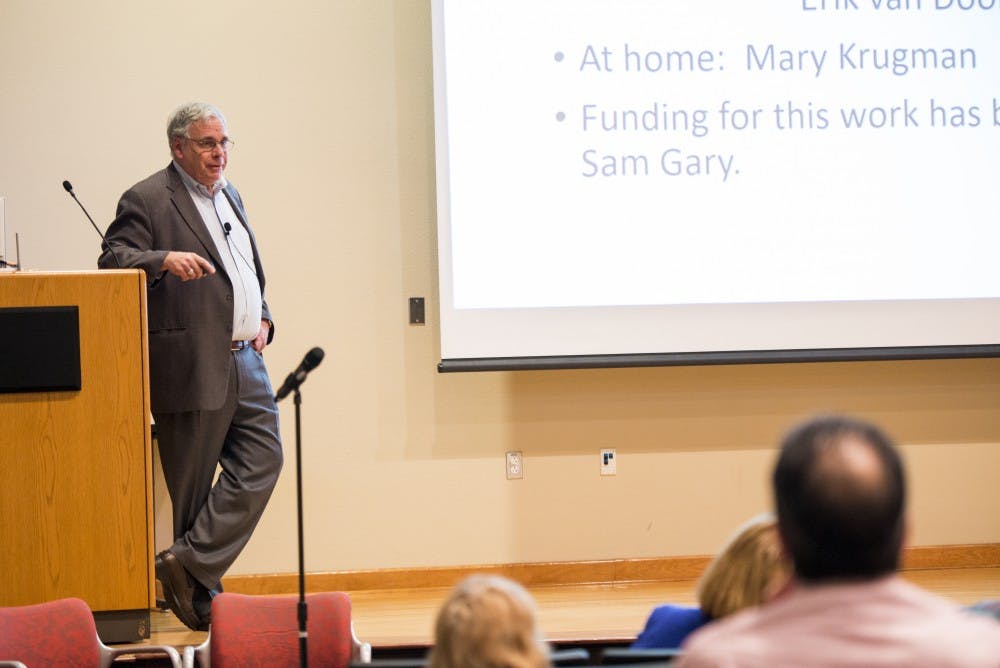On Tuesday evening UNM Health Sciences Center held a symposium to address the issues of childhood adversity affecting New Mexico.
Dr. Andrew Hsi, professor of pediatrics at the UNM School of Medicine and a key figure in UNM’s fight against childhood adversity, walked on stage for his presentation with a large, black trash bag thrown over his shoulder.
Hsi dropped the bag on the floor as he said that it was a visual presentation of the burden children and families carry with them after adverse childhood experiences.
Being involved in the field of childhood and family adversity for over 27 years with FOCUS, a division of UNM’s Center for Development and Disability, Hsi knows the weight all too well.
A staggering 60 percent of kids and adults in New Mexico have had at least one adverse childhood experience in their lives.
Hsi defines adverse childhood experiences, or ACE’s, as physical, sexual and emotional abuse or neglect that a child faces, within or outside the family unit.
Family dysfunctions, exposure to substance abuse, mentally ill parents, suicide attempts, violent treatment of a maternal parent, a parent’s imprisonment or the loss of a biological parent also fall within the ACE realm, he said.
Children exposed to ACE’s are at a higher risk for developing future mental health issues, economic instability, intravenous drug use, alcoholism, suicide attempts, obesity and risky sexual behavior, Hsi said.
Young girls who have been exposed to ACE’s are twice as likely to become pregnant as a teen than those who have not, he said.
Social worker and Associate Professor at the University of Southern California Dr. Ferrol Mennen explored the ways in which childhood trauma affects the mental health of individuals later in life.
“Consequences...can be profound and follow people their entire lives,” she said.
She listed multiple mental health issues seen in children that are affected by trauma, including PTSD, ADHD, behavioral problems and aggression issues.
Get content from The Daily Lobo delivered to your inbox
Hsi points out that because these physical and mental health issues are rooted in negative childhood experiences, some of the financial burden the health care system is facing is directly linked to the childhood adversity epidemic.
The negative impact of adverse childhood experiences are not isolated to the health of children, though. In reference to a child struggling with trauma, Hsi said the child may have difficulty in the classroom, sitting down and participating for a teacher who is trying to teach 30 other children.
Dr. Richard Krugman, a previous member of the U.S. Advisory Board of Child Abuse and Neglect, said awareness of childhood abuse here in the United States began with the 1968 publication of “The Battered-Child Syndrome,” the first major source for providers on the signs of childhood abuse.
Dr. James Jimenez of New Mexico’s Voice for Children also said that some progress here in New Mexico can be seen in the growth of insured children under the Affordable Care Act, with 74,000 new children getting coverage from 2015 to 2016.
There is much more work to be done, though, to drag New Mexico out of the 49th spot in the state ranking for childhood well-being. As the effects of childhood adversity are multifaceted, so must be the solution, he said.
Jimenez suggests using money from New Mexico’s Land Grant Fund to better finance programs for families and children facing adversity, adding that the grant has grown from $7 million to $15 million since 2003, and is not being fully utilized.
Understanding the need for legal and medical intervention in situations involving childhood adversity, Hsi has partnered with the UNM School of Law to create the Institute for Resilience, Health and Justice.
This program will help guide families through the legal system to obtain the resources they need for their health and financial situations.
Hsi said he feels the childhood protective system would benefit from “sustaining funding for a decade to see if we can make a difference,” as opposed to the fluctuating funding levels that occur with legislative seat changes every two, four and six years.
While each speaker proposed different solutions to New Mexico’s childhood well-being concerns, they shared the same sentiments in regards to parental treatment: that children would benefit most when their family is treated as a whole.
“These parents are usually people who have undergone their own trauma, their own bad parenting,” Mennen said.
Whether it be through parent-infant psychotherapy, an increase in in-home visitations or substance abuse programs for parents, Hsi said continuous care for families for a minimum of four years would be beneficial.
Hsi suggested making “trauma-informed systems of care” — that is, making the medical, educational and legal systems in our country more adept at handling the experiences and needs of traumatized individuals.
Professor David Atencio of UNM’s Department of Education agreed with the emphasis on the complex approach to childhood care in New Mexico.
“Development, health and well-being of children (is) a product of the complex dynamic of a relational system, so when we treat only the child it’s analogous to putting sand bags on one side of your house when the whole levee is breaking,” Atencio said.
Hannah Eisenberg is a news reporter for the Daily Lobo. She can be reached at news@dailylobo.com or on Twitter @DailyLobo.






